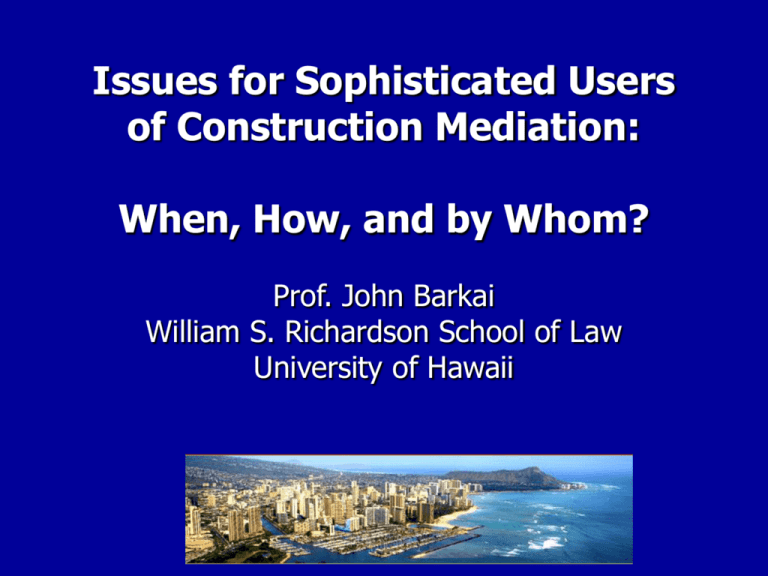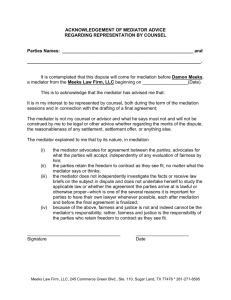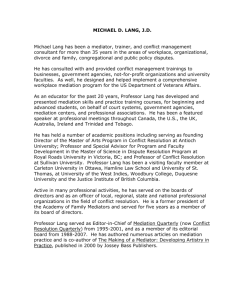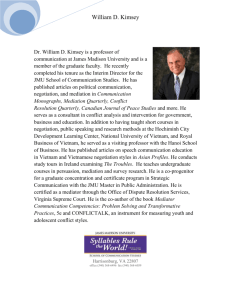Kyoto - University of Hawaii
advertisement

Issues for Sophisticated Users of Construction Mediation: When, How, and by Whom? Prof. John Barkai William S. Richardson School of Law University of Hawaii www2.hawaii.edu/~barkai Handling of Problems Western - American Asian designed by Liu Young Shichi Go San 7-5-3 “Even a sheet of paper has two sides” Japanese Proverb Perspective View "Then it's agreed. Watson, Smith, Teller, and Wilson go to Heaven; Jones, Paducci, and Horner go to Hell; and Fenton and Miller go to arbitration. Common Forms of Dispute Resolutions • Negotiation • Mediation - Conciliation • Arbitration • Trial in Court Common Forms of ADR in Construction • Partnering • Dispute Review Boards • Mediation - Conciliation • Arbitration International Arbitration – NGOs – is not used often – 3,000 per year? Why use mediation? Parties Faster, cheaper, confidential, control Lawyers Help with other side & clients Mediators Psychology of mis-evaluation, perception, over confidence, biases, etc. Some Psychological Issues Affecting Perception 1. Attribution 2. Selective Perception 3. Framing 4. Anchoring 5. Reactive Devaluation 6. Risk Preferences (Prospect Theory) 7. Endowment Effects 8. Behavioral Traps の検索結果 Okame Hatimoku (Japanese proverb) The onlookers see more than the players Plaintiff’s View of the Case Defendant’s View of the Case Reactive Devaluation Tendency to devalue offers and concessions made by made by the other side 25 Power Imbalances Styles & Types of Mediation Facilitative, evaluative, transformative, narrative, etc. Community, commercial, construction, family, employment, probate, postal service, tort, peer mediation for school-aged children, etc. Narrow or broad Caucus or non-caucus Mediation is a noun 名詞 meishi Focus on the adjective 形容詞 keiyoushi Styles of Mediation Facilitative Evaluative FACILITATIVE do NOT suggest solutions EVALUATIVE evaluate & suggest solutions TRANSFORMATIVE not concerned about solutions. They want to “empower” and “transform” the parties. United States Postal Service Facilitative mediators ASK Evaluative mediators TELL The Riskin Grid Evaluative Evaluative Narrow Evaluative Broad Narrow Broad Facilitative Facilitative Narrow Broad Facilitative When to mediate? After critical discovery; before full discovery. Have enough facts to make good decisions. More information is not better information – selective perception Tolanski Curve Illusion Who can/should/does mediate? U.S. – lawyers Anyone who can build confidence and has the process skills Know law & facts, prepared, persistent, creative, ability to evaluate Goldberg & Shaw data later How to mediate? Very much open to question Different styles can work ABA Task Force Report later American Bar Association’s Section of Dispute Resolution 2008 Task Force on Improving Mediation Quality ----------------------Goldberg & Shaw 2005 & 2007 Traits of Successful and Unsuccessful Mediators Mediation Advocacy How to “Borrow” a Mediator’s Powers Dwight Golann Problem-Solving Advocacy in Mediations Harold Abramson (2005) Controls the format & process Is usually open to process suggestions Separates or keeps the parties together Moderates the negotiation Gathers data Keeps confidences Is seen as neutral Actually is neutral Can offer a “mediator’s proposal” What does it take to be a mediator? American Bar Association’s Section of Dispute Resolution Task Force on Improving Mediation Quality The 2008 ABA Report on Improving Mediation Quality (civil disputes with lawyers) Preparation Customization Evaluation Skills Persistence Preparation Pre-mediation discussions Joint v. separate Face-to-face v. phone With or without parties Users want input into the process Mediator’s approach Will the necessary parties be present? Preparation - continued Understand interests How can it settle? Use opening statements? Joint or caucuses for certain issues Prior settlement discussions Clients v. lawyers speak Customization Adjust mediation to fit the parties needs Opening statements Useful? Will entrench? Analytical Input - Evaluation Sophisticated mediation users wanted mediators to provide analytical input (evaluate) 95% important to make suggestions 75% important to give opinions Users said (it was helpful to) 60 - 100% Ask Pointed Questions That Raise Issues; Give An Analysis Of Case (Including Strengths And Weaknesses); Make Predictions About Likely Court Results; Suggest Possible Ways To Resolve Issues; Recommend A Specific Settlement; Apply Some Pressure To Accept A Specific Solution Persistence 98% “very important” Keep at the table Exert pressure to settle Get them back to table When the going gets tough, the tough … Construction Mediations Differ Pre-mediation activities Impasse breaking strategies Complex, commercial mediations with lawyers representing the parties Pre-Mediation Activities Mediator selection Pre-mediation meetings Pre-mediation submissions Impasse Breaking Strategies Facilitative v. Evaluative Goldberg & Shaw 2005 & 2007 Traits of Successful and Unsuccessful Mediators Study 1 "How do you account for your success as a mediator? “ 75% said: Ability to develop rapport with the disputing parties Develop a relationship of understanding, empathy, and trust Why is that so important? Encourages the parties to communicate more fully with the mediator, often providing the mediator with the information the mediator needs to help the parties craft a settlement: How to build that relationship? Empathic listening, which conveys the message that the mediator truly cares about the parties' feelings, needs, and concerns (substantial majority) The mediator’s reputation for being honest, ethical, and trustworthy (some mediators) What does a mediator do after establishing rapport? • • • • • Generate novel or creative solutions Attribute the mediator’s own creative ideas to the parties Use humor Combine patience and tenacity Persistence Other tactics • • • • Focus parties on consequences of not settling (BATNA / WATNA) Push at the appropriate time Assist them to understand each other’s needs Remain optimistic Study 2 Lawyers & Parties – What lead to success? • • • Mediator’s ability to gain the parties’ confidence (friendly, empathic, likable, etc.) Mediator’s high integrity (Honesty, neutrality, trustworthiness, protection of confidences, etc.) Mediator was smart, well-prepared, or new the relevant contract or law Study 3 Why did mediators fail? • • • Lack of confidence-building attributes Lack of process skills Lack of evaluation skills Lack Of Confidence-Building Attributes • Mediator lacked integrity, neutrality, empathy; did not understand the issues or law, or was not well-prepared Lack of Process Skills • • • • Acted just as a messenger Not persistent – quit too soon Didn’t propose solutions Had bad timing Lack of Evaluation Skills • Faulty or no evaluation





